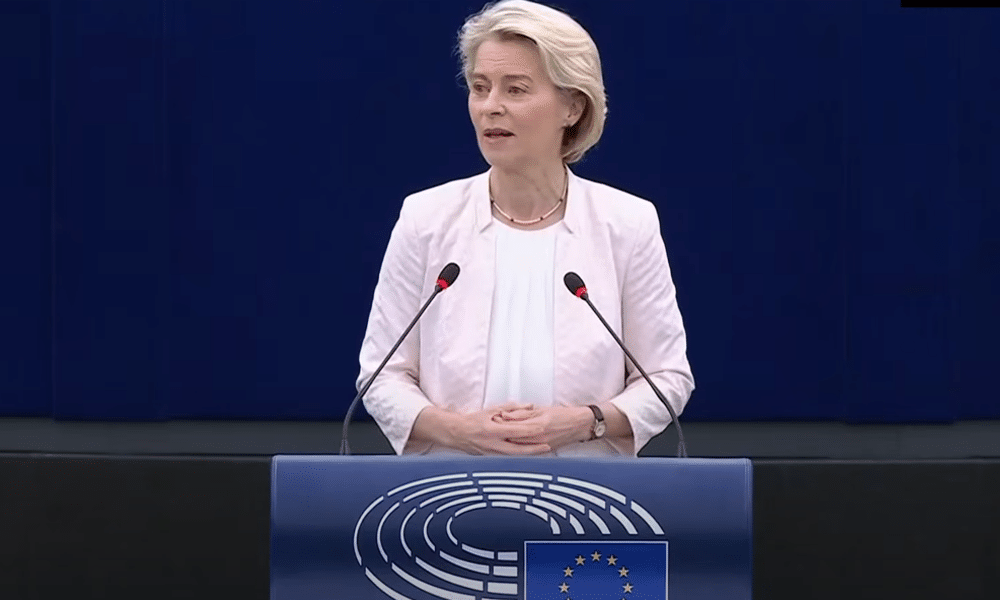In a decisive vote on Thursday (18 July), Ursula von der Leyen secured her re-election as president of the European Commission, overcoming a significant political challenge and reinforcing her legacy amidst a series of crises that have tested the European Union’s unity.
Von der Leyen received 401 votes in favor and 284 against after a rigorous questioning session in the European Parliament, securing her second five-year term with a substantial majority. This result marks a stark contrast to her narrow victory in 2019, where she was elected by a mere nine votes.
“The last five years have shown what we can do together,” von der Leyen stated. “Let us do it again. Let us make the choice of strength. Let us make the choice of leadership.”
Her re-election followed intense behind-the-scenes negotiations with the Parliament’s main groups. Although the European People’s Party (EPP), Socialists & Democrats (S&D), and Renew Europe had the numbers to re-appoint her, internal divisions necessitated reaching out to the Greens and the European Conservatives and Reformists (ECR) for additional support.
Von der Leyen’s outreach to the ECR, particularly Giorgia Meloni’s Brothers of Italy and Poland’s Law and Justice (PiS), raised concerns among progressive factions. She addressed these concerns by committing to “no structured cooperation” with Meloni’s group and reaffirming her dedication to the Green Deal.
The Greens played a crucial role in securing her re-election, as indicated by her speech’s emphasis on climate action. “We have secured commitments on the Green Deal, making the EU more socially fair and protecting democracy,” the Greens confirmed in their statement.
Conversely, the ECR opposed her re-election, with Meloni’s Brothers of Italy confirming their votes against her.
Von der Leyen’s address included promises tailored to various centrist groups. For the Socialists, she proposed a new Commissioner for housing and a roadmap for women’s rights. The Liberals saw their demands for member states to respect the rule of law tied to EU funds reflected in her guidelines. The EPP’s priorities, such as a European Defence Fund and an expanded Frontex, were also included.
Her guidelines did not endorse offshoring asylum procedures but promised to explore new methods to counter irregular migration, respecting international law and ensuring fair solutions for migrants.
In her candidacy speech, von der Leyen criticized Viktor Orbán’s “peace mission” as “plain appeasement,” receiving loud applause from the chamber. She emphasized Europe’s role in protecting its democracy, investing in security, and embracing change for prosperity.
“Europe cannot control dictators and demagogues across the world, but it can choose to protect its own democracy,” von der Leyen told lawmakers. “Europe cannot determine elections across the world, but it can choose to invest in the security and defence of its own continent. Europe cannot stop change, but it can choose to embrace it by investing in a new age of prosperity and improving our quality of life.”
She further highlighted the importance of EU enlargement, stating, “Our neighbourhood is home to our future. Inviting countries into our Union is a moral, a historical and a political responsibility. It is an enormous geostrategic responsibility for Europe. Because in today’s world a larger Union will be a stronger Union. It will strengthen our voice in the world. It will help reduce our dependencies. And it will ensure that democracy, prosperity and stability spread across Europe.”
Von der Leyen also addressed the situation in the Middle East, emphasizing the need for an immediate and enduring ceasefire in Gaza. “Europe has a responsibility to play an active role in the world, starting in our neighbourhood and in particular in the Middle East. I want to be clear: the bloodshed in Gaza must stop now.”
“Too many children, women, and civilians have lost their lives as a result of Israel’s response to Hamas’ brutal terror. The people of Gaza cannot bear any more. Humanity cannot bear it. We need an immediate and enduring ceasefire. We need the release of Israeli hostages. And we need to prepare the day after. Europe must play its part.”
“We have massively increased our humanitarian aid to almost EUR 200 million in 2024. And we will do more. We are now working on a much larger multi-year package to support an effective Palestinian Authority. The two-state solution is the best way to ensure the security of both Israelis and Palestinians. People in the Middle East deserve peace, security, and prosperity. And Europe will be at their side.”
Rejecting von der Leyen’s candidacy would have led to an unprecedented “institutional crisis,” as described by anonymous diplomats. The global instability, including conflicts in Ukraine and Gaza, bolstered her case for continuity and stability.
“We may certainly not agree on everything but we should all agree that Europe is stronger when we bridge our differences and join our forces,” she told MEPs. “If you give me your trust, I will be honored to turn all these actions into reality together with you.”
Von der Leyen’s next step involves interviewing candidates for Commissioners submitted by each member state, forming her new executive, which will face a confirmation vote in Parliament later this year.
If approved, the 27 Commissioners will commence their work, continuing the European Commission’s mission.

